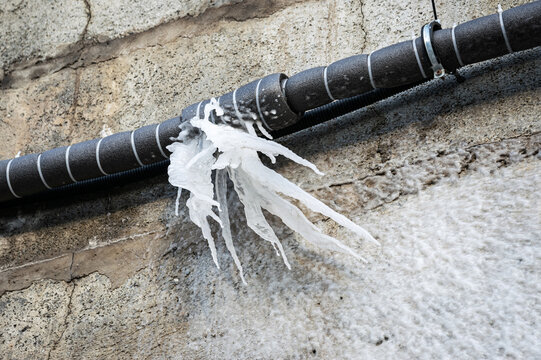Important Tips to Avoid Frozen Pipes in Cold Weather: Specialist Guidance
Important Tips to Avoid Frozen Pipes in Cold Weather: Specialist Guidance
Blog Article
This post down the page pertaining to How to prepare your home plumbing for winter weather is immensely motivating. Read on and draw your own results.

Winter can damage your plumbing, particularly by freezing pipes. Below's just how to stop it from occurring and what to do if it does.
Introduction
As temperatures decline, the danger of frozen pipelines increases, potentially leading to pricey repair work and water damage. Recognizing exactly how to prevent frozen pipes is vital for property owners in cold climates.
Understanding Icy Pipelines
What causes pipes to ice up?
Pipelines ice up when revealed to temperatures listed below 32 ° F (0 ° C) for extended durations. As water inside the pipes freezes, it expands, taxing the pipeline walls and possibly creating them to break.
Dangers and problems
Icy pipes can cause water supply interruptions, residential or commercial property damage, and pricey fixings. Burst pipes can flooding homes and create extensive structural damage.
Indications of Frozen Piping
Identifying frozen pipelines early can prevent them from bursting.
Exactly how to determine frozen pipelines
Try to find reduced water flow from faucets, uncommon smells or sounds from pipes, and noticeable frost on revealed pipes.
Avoidance Tips
Shielding prone pipes
Cover pipes in insulation sleeves or utilize warm tape to protect them from freezing temperature levels. Focus on pipelines in unheated or outside areas of the home.
Home heating techniques
Maintain interior rooms adequately warmed, particularly areas with pipes. Open up cabinet doors to permit warm air to flow around pipes under sinks.
Securing Exterior Plumbing
Garden tubes and outdoor faucets
Detach and drain pipes yard hoses before wintertime. Mount frost-proof faucets or cover outdoor faucets with insulated caps.
What to Do If Your Pipes Freeze
Immediate actions to take
If you presume icy pipelines, maintain faucets open up to eliminate pressure as the ice thaws. Make use of a hairdryer or towels taken in hot water to thaw pipes slowly.
Long-Term Solutions
Structural adjustments
Think about rerouting pipes away from exterior walls or unheated areas. Add extra insulation to attics, cellars, and crawl spaces.
Updating insulation
Invest in high-grade insulation for pipes, attic rooms, and walls. Correct insulation aids preserve consistent temperature levels and decreases the danger of frozen pipelines.
Verdict
Preventing frozen pipes calls for aggressive procedures and quick responses. By comprehending the causes, indications, and safety nets, property owners can secure their pipes throughout cold weather.
6 Proven Ways to Prevent Frozen Pipes and Protect Your Home
Disconnect and Drain Garden Hoses
Before winter arrives, start by disconnecting your garden hoses and draining any remaining water. Close the shut-off valves that supply outdoor hose bibs and leave the outdoor faucet open to allow any residual water to drain. For extra protection, consider using faucet covers throughout the colder months. It’s also important to drain water from any sprinkler supply lines following the manufacturer’s directions.
Insulate Exposed Pipes
Insulating your pipes is an effective way to prevent freezing. Pipe insulation is readily available at home improvement stores and is relatively inexpensive. Pay close attention to pipes in unheated areas such as the attic, basement, crawl spaces, or garage. Apply foam insulation generously to create a buffer against the cold. You can also wrap your pipes in heat tape or thermostat-controlled heat cables for added warmth.
Seal Air Leaks
Inspect your home for any cracks or openings that could let in cold air. Seal any holes around the piping in interior or exterior walls, as well as the sill plates where your home rests on its foundation. Additionally, make sure to keep your garage door closed unless you’re entering or exiting. Leaving it open creates a significant air leak that can lead to frozen pipes.
Allow Warm Air Circulation
During cold snaps, it’s essential to allow warm air to circulate evenly throughout your home. Leave interior doors ajar to promote better airflow. Open kitchen and bathroom cabinets to help distribute heat consistently around the rooms. If you have small children or pets, be sure to remove any household chemicals or potentially harmful cleaners from open cabinets for safety.
Let Faucets Drip
A small trickle of water can make a big difference in preventing ice formation inside your pipes. When temperatures drop significantly, start a drip of water from all faucets served by exposed pipes. This continuous flow helps prevent the water from freezing. Additionally, running a few faucets slightly can relieve pressure inside the pipes, reducing the chances of a rupture if the water inside does freeze.
https://choateshvac.com/6-proven-ways-to-prevent-frozen-pipes-and-protect-your-home/

I stumbled upon that blog posting about How to prepare your home plumbing for winter weather when doing a lookup on the search engines. Do you know about someone else who is looking into the niche? Please feel free to promote it. Thanks a lot for being here. Return soon.
Find Out More Report this page